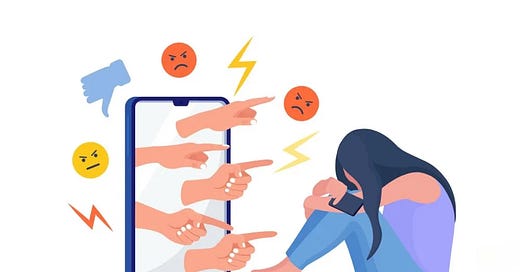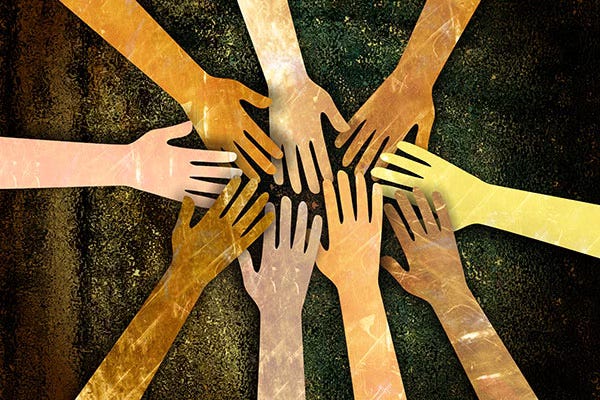Holding on to our humanity in an inhumane world
Social media has made it easier than ever for us to surrender our values and empathy to mob mentality
“The greatness of humanity is not in being human, but in being humane,” Mahatma Gandhi
In the 1980s, Rush Limbaugh’s radio program was seemingly omnipresent. You could hardly find a restaurant or bar in Texas at that time that didn’t have a “Rush room,” a place where people would come together to listen to his show. Even as a kid, I thought Limbaugh was a gross bloviator, but the normalization of his gleeful mockery of others—especially of the most marginalized people in America—was shocking. I had a hard time understanding why adults I respected were entertained by his demeaning behavior, from critiquing people’s looks and weight to calling women sluts to making fun of homeless people.
Limbaugh was a demagogue who got rich off of hate speech and lies, and he helped polarize America through the degradation of democracy for decades. And too many Americans not only enabled his divisiveness, but they reveled in it. Now, nearly 50 years later, that culture of cruelty has been turbocharged by social media. Call it herd mentality or mob behavior, there’s a psychological phenomenon online that foments hateful and harmful attacks that would normally be considered beyond the pale in society.
As someone who has been very online for a very long time, I’ve watched these online attacks—typically on Twitter/X—play out over and over again, but even I was shocked by the virtual mob that formed this week after the murder of a health insurance executive by a masked man in Midtown, Manhattan.
The main theme animating many of the social media posts about the killing was that the CEO and other insurance company executives harm and kill Americans by denying coverage in the name of profit. People online wrote that not only did the victim not deserve sympathy, but he deserved to die. Prominent people—not just bots—were defending, condoning, and even cheering the executive’s murder.
According to the Network Contagion Research Institute at Rutgers University, tens of thousands of people expressed support on social media for the killing of UnitedHealthcare’s CEO, or sympathized with it. These posts, viewed by nearly 10 million accounts, garnered hundreds of thousands of likes and tens of thousands of reposts. On the official Facebook post about the CEO’s death from UnitedHealth Group, over 40,000 people—most of the people who reacted—used the “laughter” emoji.
When I Tweeted that I was creating a block list of all the Twitter, Threads and Blusky users excusing or celebrating the killing, I suddenly found myself in the crosshairs of the online mob. I was called privileged, classist, and, of course, a whole host of expletives and insults. But my outrage at the murder and my empathy for the victim and his family didn’t come from a lack of concern for people in the healthcare system; it came from knowing two things can be true at once: the health insurance system is broken and must be fixed, and gun violence and murder are wrong.
In the early 2000s, my stepfather was diagnosed with glioblastoma. He had a seizure one afternoon while hanging a painting; the next day, we were told he had a deadly brain tumor. That’s when the battles with his insurer, UnitedHealthcare, started; until my stepfather died one year after his diagnosis, the company repeatedly denied coverage for medications, treatments and clinical trials. It was a constant battle to pay his medical bills and procure the care he needed; the struggle added significant suffering to what we were already going through as a family. And yet, it would still never occur to me to celebrate—or even be indifferent to—the murder of someone who worked at UnitedHealthcare.
That’s in part because I’ve seen gun extremists use this same moral relativism to defend the actions of armed vigilantes. They claim Kyle Rittenhouse had a right to show up at a protest of a police shooting with a semiautomatic rifle to protect others’ property and then called him a hero after he opened fire and killed and wounded others under the pretense of self-defense. They condone bounties put on abortion providers by right-wing lawmakers, saying they’re protecting the unborn. They justify extra-judicial murders in the name of an eye for an eye. In the end, they justify harming—and even killing—other people as a valiant effort to combat “evil.” But this unsympathetic rhetoric is simply the other side of the same coin we saw online this week.
Social sadism—excusing immorality, numbing ourselves to tragedies, and even rejoicing in other people’s pain—doesn’t just cause others to suffer; we suffer, too. It undermines trust, damages social cohesion, incites fear, and can lead to a breakdown in positive social interactions and a sense of safety. Regardless of whether we’re conservative or progressive, when we allow ourselves to view anyone who isn’t “on our side” as our enemy, it makes it that much easier to justify blaming people for their own deaths or assaults based on how much money they have, or what they do for a living.
Social media is built to encourage us to escalate conflict and lose our sense of self. Here are some ways I’ve found to avoid falling into this trap and to hold on to my humanity:
Be aware of your environment: We are all vulnerable to group polarization. When humans interact within a group—in real life or online—research shows they’re more likely to adopt more extreme opinions, amplifying the group’s collective beliefs. This results in escalating conflicts, marginalization or suppression of other people’s viewpoints, and groupthink, a phenomenon in which people prioritize consensus over critical thinking. We don’t have total control over the systems that cause us systemic suffering, but we do have total control over our reactions to it. And we have a responsibility to ensure our responses to tragedies are humane; not based on emotion and tribalism, but on reason and an ethical code.
Be constructive: Engage in respectful debates and discussions and avoid bullying or insults. Reflect on what you’re about to post and consider the potential impact on others. If your content might be hurtful or offensive to anyone, reconsider or rephrase it. Remember that hiding behind a computer screen encourages you to say all kinds of things you might not say to someone in real life. Consider how many times your mind has been changed due to arguing with someone on social media. If your answer is none, don’t waste your time and energy arguing with strangers (or friends) online. And remember that once something is posted, it’s impossible to take it back.
Cultivate empathy: In a society marked by increasing division, we could all be a bit more kind, cooperative, and tolerant toward others. Beneficial as those traits are, psychological research suggests empathy may be the umbrella trait required to develop all these virtues. As empathy researcher and Stanford University psychologist Jamil Zaki, PhD, describes it, empathy is the “psychological ‘superglue’ that connects people and undergirds co-operation and kindness” (The Economist, June 7, 2019). And even if empathy doesn’t come naturally, research suggests people can cultivate it by having a growth mindset, exposing themselves to differences, asking questions instead of making statements, and identifying common ground (feeling a sense of social connection is an important part of triggering prosocial behaviors).
Take a break: I felt overwhelmed by the hate online this week, so I made a concerted effort to stay on Instagram for a couple of days (I find it to be much kinder than Twitter, Blusky or Threads). To take a break from social media, you can: disable notifications, set time limits on your usage, delete apps temporarily, find alternative activities to replace social media time, inform close friends and family about your break, practice mindfulness to manage cravings, and actively limit your exposure by replacing social media time with other pursuits like reading.
Elie Wiesel, a Jewish prisoner who survived the Auschwitz and Buchenwald concentration camps, said in a 1999 speech at the White House that the indifference to the suffering of others “is what makes the human being inhuman,” adding: “The political prisoner in his cell, the hungry children, the homeless refugees not to respond to their plight, not to relieve their solitude by offering them a spark of hope is to exile them from human memory. And in denying their humanity, we betray our own.”
When we look away from or cheer on the death of another human—even if our excuse is that we think that their suffering is retribution for acting inhumanely—we betray our own humanity. It may feel good in the moment—especially if a crowd of people is cheering us on—but the harm it does to ourselves and society may be irreparable.
My upcoming book, Fired Up: How to Turn Your Spark Into a Flame and Come Alive at Any Age, is now available for preorder! This book is my guide to figuring out what lights you up and will show you how to live on fire every day. Click here to preorder and get locked into some incredible bonuses.








Excellent article Shannon. And so true. Retaliation is never the answer -- it only reduces us to the level of the perpetrator and makes us the same.
Thank you for your moral clarity, Shannon. This is what Michelle Obama meant by "When they go low, we go high."